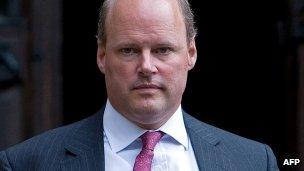Why Hester turned down the bonus
- Published
- comments
It was Labour's decision to put Stephen Hester's bonus to a Commons vote that gave the RBS chief executive no option but to say he would not be taking £963,000 in shares.
As an RBS director put it to me, it would have been a great mistake for the semi-nationalised bank to fight parliament to preserve rewards for its chief executive seen by many as excessive.
MPs were expected to vote against the bonus payment - and in those circumstances, it was untenable for him to pocket it. Or at least that was the conclusion that Mr Hester reached tonight in conversation with the bank's chairman, Sir Philip Hampton.
That said, RBS's non-executive directors stand by their decision to award Mr Hester 60% of the maximum bonus he could have earned - because they feel he has strengthened the bank, and they argue that Mr Hester is paid less than his peers.
So in that sense the board feel Mr Hester has made the correct decision in making the financial sacrifice.
His waiving of the bonus lances one boil. But the bank still has to decide what to award Mr Hester under a separate pay scheme, known as the long-term incentive plan - under which he could receive shares worth up to four times his salary of £1.2m.

RBS still has to decide what to award Mr Hester under a separate pay scheme
But the bank's directors will make no decision on that till they see what other banks, especially Barclays, pay their chief executives. RBS will only wish to reward Mr Hester in line with the perceived market rate or a bit less.
Which is why the bank's directors now bitterly regret having brought forward the decision on Mr Hester's bonus by around a month. It accelerated the decision on the bonus because it was asked to do so by the government - with ministers believing that it was a good idea to get the controversy over the bonus out of the way as soon as possible.
RBS's directors now recognise it would have been far better to delay the bonus decision until after the world had seen what Barclays' chief executive, Bob Diamond, is being paid - because Mr Hester's bonus would not look big in comparison.
Damage has been done by the row, not least to the morale of Mr Hester.
Colleagues say he is not angling to leave the bank - even though he feels bruised by the public scrutiny to which he has been subjected. But if an opportunity to go to another big job less in the spotlight were offered to him, the temptation of leaving might well prove irresistible.